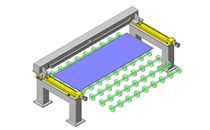(!) Since support from Microsoft will end on January 14 2020, Windows 7 user might not be able to use MISUMI website effectively. Please consider to update your system as ‘MISUMI Website system requirement’.
- แจ้งวันหยุดทำการในเดือน พฤษภาคม 2567 | Notice holiday in May 2024 > คลิก
Flexible Shaft Couplings
Couplings serve a crucial role in transmission system by connecting two shafts and facilitating the transmission of torque between them. These devices are essential in various applications where precise and reliable power transmission is required. When selecting couplings, it is crucial to consider factors such as Shaft Bore Diameter, Overall Length , Materials (e.g., Stainless Steel, Steel, Aluminum, Plastic and etc.), Features(e.g., Clean Environment, Heat Resistant , High Torque and so on). These considerations are vital for ensuring the production of high-quality products. We highly recommend reputable brands like MISUMI, ADVANCED, COUP-LINE, as well as cost-effective options from MISUMI ECONOMY.
Take advantage of the convenience of FREE SHIPPING and NO MINIMUM ORDER on couplings. If you have any doubts or require assistance in choosing the right product, our experts are readily available to provide.
Take advantage of the convenience of FREE SHIPPING and NO MINIMUM ORDER on couplings. If you have any doubts or require assistance in choosing the right product, our experts are readily available to provide.
|
Type
|
|
|---|---|
Brand |
|
| CAD |
|
| Days to Ship |
|
Product not found.
Loading...
Related Categories to Flexible Shaft Couplings
FAQ Flexible Shaft Couplings
- Question: What are the different types of flexible Shaft Couplings?
- Answer: There are several types of flexible Shaft Couplings, including beam, bellows, jaw, Oldham, disc, diaphragm, and gear couplings. Each type has unique features and benefits that make them suitable for different applications and environments. Flexible Shaft Couplings are used to connect two shafts and allow for misalignment while transmitting torque between them.
- Question: What factors should be considered when selecting a flexible Shaft Couplings?
- Answer: The factor for selecting a flexible coupling, there are several factors that should be considered, including the required torque capacity, misalignment capability, operating speed, and environmental factors such as temperature and humidity. Other considerations include the required degree of axial and radial stiffness, the space available for the coupling, and the type of equipment being connected. It is also important to consider the potential for wear and tear, maintenance requirements, and the cost of the coupling.
- Question: How is a flexible Shaft Couplings installed and maintained?
- Answer: Shaft Couplings are installed by aligning the shafts and tightening the screws or bolts. Maintenance involves regular inspections for signs of wear, damage, or misalignment. Lubrication is important to prevent excessive wear and reduce friction. Cleaning and tightening of bolts and screws are also necessary to ensure proper operation.
- Question: What is the difference between a flexible coupling and a rigid coupling?
- Answer: A flexible coupling allows for some misalignment between two connected shafts while transmitting torque, while a rigid coupling does not allow for any misalignment. Flexible Shaft Couplings are designed to absorb shock and vibration, which can help reduce wear and tear on connected equipment. Rigid couplings, on the other hand, are used in applications where precise alignment between shafts is critical, such as in high-speed rotating equipment or precision machinery.





























How can we improve?
How can we improve?